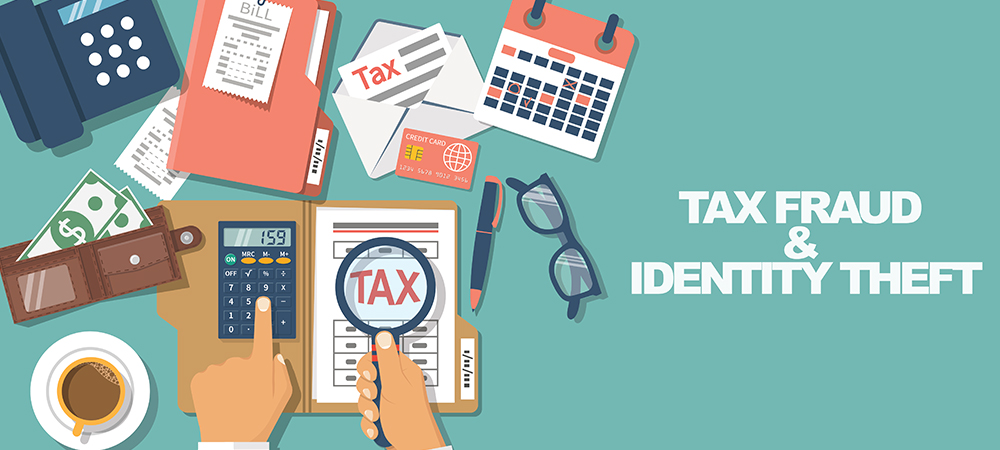Get Ahead of Tax Fraud and Identity Theft
Filing your taxes can be a pain, but dealing with tax fraud and identity theft can be even worse. As we scramble to compile our W-2s and file our returns by the April deadline, we often forget that tax season is also considered open season for identity thieves.
Many of last year’s large-scale data breaches (like Equifax and Alteryx) have already given identity thieves a leg-up in the tax fraud and identity theft game. These breach events exposed a multitude of personal and financial information that experts predict will be used to fraudulently file tax returns this year.
Fraudsters also effectively cover their bases by using a variety of tax-related scams that play on a victim’s fears. Scammers hope they can convince you to hand over personal and financial information to be used in other crimes.
What should you look for? What can you do? Find all the answers to your tax crime-related questions concerning your personal information, the scams targeting you and best tax-filing practices.
Filing taxes and identity theft?
Let’s start with the basics – criminals steal personal information to commit fraud and identity theft. Identity thieves use your sensitive information to either take from your existing accounts (fraud) or open new ones posing as you (identity theft).
Fraudsters hope to capture your personal information both in and outside of tax season. Your Social Security number is highly valued by criminals – especially ones who want your tax refunds. Identity thieves know that your Social Security number is key in accessing your refunds. In fact, the IRS intercepted 787,000 confirmed identity theft returns last year that totaled around $4 billion.
Apart from data breach events – with tons of personal and financial information exposed every day – identity thieves scam victims out of their money and data by posing as IRS tax agents. Scammers use a variety of social engineering tactics and intimidating threats to ultimately convince them to pay up or provide personal information directly to the thieves. But knowing what the IRS won’t do is key in spotting these fake tax scams.
The IRS Will Never…
#1 Request payments via email or phone.
The premise of this scam is simple – fraudsters impersonate an IRS agent and convince you to make a payment over the phone or online.
When this scam is conducted over the phone, the scammer calls you claiming that you must pay your taxes or face various consequences. Criminals may even specify that payments must be made via prepaid cards or wire transfers so it’s less likely that the payment can be reversed.
Online, this scam utilizes classic phishing tactics to steal your personal information and funds. Scammers send emails that prompt you to reply directly with personal or financial information, or visit a spoofed website that looks real. Fraudsters will create emails and web pages that look like IRS communications to further convince victims of their legitimacy.
#2 Mention lawsuits or arrest warrants that are allegedly tied to your unpaid taxes.
Scammers use intimidation tactics to scare victims into complying to their demands. These tax scams utilize the idea of a lawsuit or arrest warrant to convince victims into paying the requested dues without asking many questions. Of the 240 million tax returns filed each year, only 1 in 80,000 ever result in criminal prosecution. In fact, most tax enforcement is on the civil level – meaning that if you were being investigated for a criminal tax offense, you’d know well before you received that call.
What should I do?
Stay one step ahead of tax identity thieves this year by keeping these tax tips in mind:
- File your taxes as early as possible. If you can file earlier than the fraudsters, you’re less likely to be impacted by tax fraud or identity theft. Plus, tax season opened Jan. 29 this year – meaning if you haven’t already started, go ahead and start now!
- Keep your Social Security number safe at all costs. Eligible taxpayers can also consider getting an IP PIN, or a unique number used in concert with your Social Security number for authentication purposes.
For more information about IP PINs, visit https://www.irs.gov/identity-theft-fraud-scams/get-an-identity-protection-pin. - Know the signs of a scam. If you receive a phone call or email that requires you to make an immediate payment, hang up or delete the message immediately. To report tax-related scams, use the resources below:
- Report scams to the Treasury Inspector General for Tax Administration (TIGTA).
- Report scams to the Federal Trade Commission (FTC).
- Forward phishing emails to [email protected].

